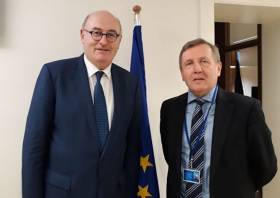Displaying items by tag: Agrifish Council
Marine Minister Calls For Swift Action To Support Fishermen In Event Of Hard Brexit
Speaking at the Agrifish Council in Luxembourg yesterday (Monday 14 October), Marine Minister Michael Creed welcomed the solidarity shown by EU member states and institutions regarding Brexit.
Highlighting the need for a swift response to help fishermen and farmers in the event of a hard Brexit, Minister Creed said: “I call on the Commission to be ready to deploy an exceptional aid regulation immediately in the event of a hard Brexit.”
During the Agrifish Council, which continues today (Tuesday 15 October), Minister Creed had constructive discussions with Commissioners Phil Hogan and Karmenu Vella regarding support measures in the event of a hard Brexit and the protection of Irish farming and fishery interests in EU trade negotiations.
With regard to fisheries, Minister Creed took the opportunity to discuss with fellow fisheries ministers the ongoing Brexit preparatory work by the eight EU member states most likely to be impacted.
Minister Creed said: “There has been a significant amount of preparatory work done at official and industry level across the member states and in co-operation with the Commission for all scenarios. The unity of purpose from our EU partners on fisheries, like all other issues, has been heartening.”
Separately, Ireland is also raising at this council the recent decision by Iceland and others to increase their unilateral quotas for mackerel, which threatens the long-term sustainability of Ireland’s single most important fishery.
The minister said: “The recent unilateral actions by Iceland, and later Russia and Greenland, are extremely regrettable and I will continue to work closely with the Commission on possible measures that can be taken in this regard.”





























































